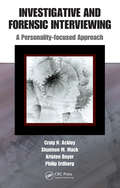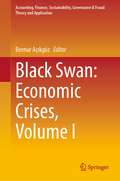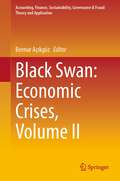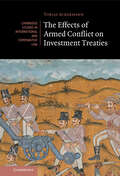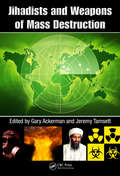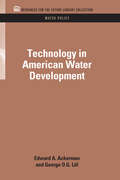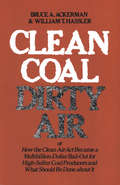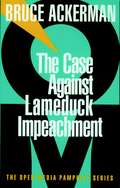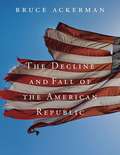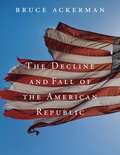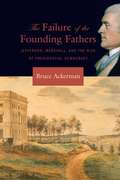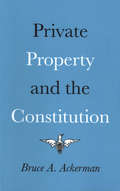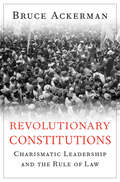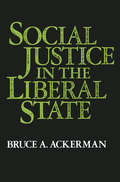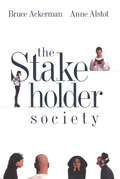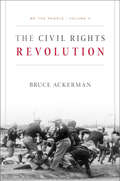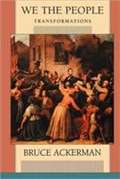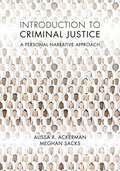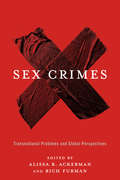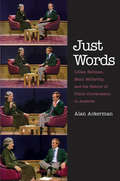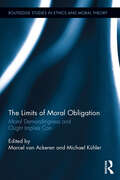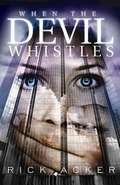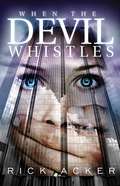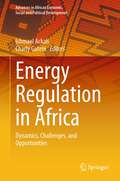- Table View
- List View
Investigative and Forensic Interviewing: A Personality-focused Approach
by Craig N. Ackley Shannon M. Mack Kristen Beyer Philip ErdbergInvestigative and Forensic Interviewing: A Personality-Focused Approach looks at the personality styles most commonly encountered in the criminal justice system and demonstrates how to use this insight to plan and conduct a productive interview. The book includes chapters on narcissistic, antisocial, psychopathic, borderline, inadequate/immature, p
Black Swan: Economic Crises, Volume I (Accounting, Finance, Sustainability, Governance & Fraud: Theory and Application)
by Bernur AçıkgözThis book presents to the reader the economic, fiscal and financial crises in world history that have had a great impact on the entire world and the fiscal measures taken by governments to combat each crisis since the 1600s in chronological order. Such events are often described as Black Swans, a concept introduced by economist and risk analyst Nassim Nicholas Taleb in the book Fooled By Randomness in 2001, in reference to events that were thought to be impossible but had a huge impact when they did happen.The first part of the book discusses the crisis models in order to allow the reader to better understand the financial, fiscal and economic crises that are detailed in the following chapters. Each chapter starts with an overview of the crisis in question followed by an analysis of the impact on the affected countries. They go on to highlight the causes of the crisis in question, the fiscal and financial measures employed to recover from it and ends on a description of the post-crisis period.Given the profusion of black swan events that the 21st century has already witnessed, this book would be a valuable read for academics and students of economics as well as practitioners and policy makers.
Black Swan: Economic Crises, Volume II (Accounting, Finance, Sustainability, Governance & Fraud: Theory and Application)
by Bernur AçıkgözThis book continues the discussion from Volume I on economic, fiscal, and financial crises in world history that have had a great impact on the entire world and the fiscal measures taken by governments to combat each crisis. Such events are often described as black swans, a concept introduced by Economist and Risk Analyst Nassim Nicholas Taleb in the book Fooled By Randomness in 2001, in reference to events that were thought to be impossible but had a huge impact when they did happen.The beginning of this book notes that crises are catastrophic periods when the consequences of economic mistakes made by governments are reflected to the public. Although economic crises are seen as opportunities in some cases, they have created a burden for the people. Some economic crises even triggered the world war. A recent example, Adolf Hitler, was seen as a hope of salvation in Germany due to the Great Depression and was brought to power.The twentieth century, when two great world wars took place on the stage of history, is the witness of major economic crises as well as wars. These crises have caused social and economic paradigm shifts to be experienced much faster and more effectively than the previous centuries. The transformation of the demand-oriented economic understanding created by the Great Depression in 1929 into an interventionist social state understanding, especially after the World War Two, increased the intervention of states in the socioeconomic field. In this period, the reconstruction of the countries, the development of social welfare services, the assurance of human rights, the acceleration of industrialization and development, and the economic growth and income growth of the countries resulted in the golden age enjoyed by the societies of the period.The interventionist social state, seen as a prescription and opportunity in the past crisis, was one of the cornerstones of the crisis in the last quarter of the century in the 1970s. Against interventionism, with the rise of neo-liberalism, financial liberalization, information society, and technological discoveries, globalization has become the new phenomenon of the age. This book examines in detail the causes, occurrences, and results of the twentieth-century crises.
The Effects of Armed Conflict on Investment Treaties (Cambridge Studies in International and Comparative Law #169)
by Tobias AckermannThis book analyses the multi-faceted impact armed conflict has on investment treaties. Refuting the common association of the outbreak of hostilities with the termination or suspension of treaties, it not only makes a case for the continuity of investment treaties. The book argues that the impact of armed conflict on such agreements goes far beyond these questions: Changed factual circumstances and public interests as well as international humanitarian law heavily influence the application and interpretation of investment protection standards. The book argues that investment treaties can and must channel these effects to remain effective during armed conflict and strike a fair balance between investor and public interests. It shows ways in which contextual and systemic interpretation, respect for reasonable state action, and careful treaty design can ensure that investment treaties continue to fulfil their purpose of strengthening compliance with legal rules also in times of armed conflict.
Jihadists and Weapons of Mass Destruction
by Gary Ackerman Jeremy TamsettExplores the Nexus Formed When Malevolent Actors Access Malignant MeansWritten for professionals, academics, and policymakers working at the forefront of counterterrorism efforts, Jihadists and Weapons of Mass Destruction is an authoritative and comprehensive work addressing the threat of weapons of mass destruction (WMD) in the hands of jihadists,
Poisoned for Pennies: The Economics of Toxics and Precaution
by Frank Ackerman"Cost-benefit analysis" is a term that is used so frequently we rarely stop to think about it. But relying on it can lead to some dubious conclusions, as Frank Ackerman points out in this eye-opening book. For example, some economists have argued that states should encourage--and even subsidize--cigarette smoking by citizens because smoking will shorten life spans and therefore reduce the need and expense of caring for the elderly. How did the economists reach that conclusion? The answer is cost-benefit analysis, Ackerman explains. Then in clear, understandable language, he describes an alternative, precautionary approach to making decisions under uncertainty. Once a mere theory, the precautionary principle has now been applied in practice through the European Union's REACH protocol. Citing major studies, many of which he has directed, he shows that the precautionary approach has not only worked, but has been relatively cheap. Poisoned for Pennies shows how the misuse of cost-benefit analysis is impeding efforts to clean up and protect our environment, especially in the case of toxic chemicals. According to Ackerman, conservatives--in elected office, in state and federal regulatory agencies, and in businesses of every size--have been able to successfully argue that environmental clean-up and protection are simply too expensive. But he proves, that is untrue in case after case. Ackerman is already well known for his carefully reasoned attacks on the conventional wisdom about the costs of environmental regulation. This new book, which finds Ackerman ranging from psychological research to risk analysis to the benefits of aggressive pesticide regulation, and from mad cow disease to lead paint, will further his reputation as a thought leader in environmental protection. We can't afford not to listen to him.
Technology in American Water Development (RFF Water Policy Set)
by Edward A. Ackerman George O.G. LoffFirst Published in 2011. Routledge is an imprint of Taylor & Francis, an informa company.
Clean Coal/Dirty Air
by Bruce Ackerman William T. HasslerA path-breaking effort in constitutional theory which brings a new clarity to the interpretation of the Fifth Amendment's just compensation clause. Essential reading for lawyers concerned with environmental regulation or the general development of constitutional doctrine.
The Case Against Lame Duck Impeachment (Open Media Series)
by Bruce AckermanAn incisive legal argument that the attempt to impeach then-President Bill Clinton was not only ethically troubling, but actually against the basic legal procedures of the House and Senate and thus unconstitutional. A wake-up call, relevant even today, of the lengths to which the American right will go in order to bring down their rivals, even under the scrutinizing eyes of the world.
The Decline and Fall of the American Republic (The Tanner Lectures on Human Values, Book #12)
by Bruce AckermanBruce Ackerman shows how the institutional dynamics of the last half-century have transformed the American presidency into a potential platform for political extremism and lawlessness. Watergate, Iran-Contra, and the War on Terror are only symptoms of deeper pathologies. Ackerman points to a series of developments that have previously been treated independently of one another--from the rise of presidential primaries, to the role of pollsters and media gurus, to the centralization of power in White House czars, to the politicization of the military, to the manipulation of constitutional doctrine to justify presidential power-grabs. He shows how these different transformations can interact to generate profound constitutional crises in the twenty-first century--and then proposes a series of reforms that will minimize, if not eliminate, the risks going forward. The book aims to begin a new constitutional debate. Americans should not suppose that Barack Obama's centrism and constitutionalism will typify the presidencies of the twenty-first century. We should seize the present opportunity to confront deeper institutional pathologies before it is too late.
The Decline and Fall of the American Republic (Tanner lectures on human values #6)
by Bruce AckermanConstitutional thought is currently dominated by heroic tales of the Founding Fathers — who built an Enlightenment machine that can tick-tock its way into the twenty-first century, with a little fine-tuning by the Supreme Court. However, according to Bruce Ackerman, the modern presidency is far more dangerous today than it was when Arthur Schlesinger published the Imperial Presidency in 1973. In this book, he explores how the interaction of changes in the party system, mass communications, the bureaucracy, and the military have made the modern presidency too powerful and a threat to liberal constitutionalism and democracy. Ackerman argues that the principles of constitutional legitimacy have been undermined by both political and legal factors. On the political level, by “government by emergency” and “government by public-opinion poll”; on the legal, by two rising institutions: The Office of Legal Counsel in the Department of Justice and the Office of the Presidential Counsel in the White House. Both institutions came out of the New Deal, but have gained prominence only in the last generation. Lastly, Ackerman kicks off a reform debate that aims to adapt the Founding ideal of checks-and-balances to twenty-first century realities. His aim is not to propose definitive solutions but to provoke a national debate on American democracy in its time of trouble.
The Failure of the Founding Fathers: Jefferson, Marshall, And The Rise Of Presidential Democracy
by Bruce ACKERMANBased on seven years of archival research, the book describes previously unknown aspects of the electoral college crisis of 1800, presenting a revised understanding of the early days of two great institutions that continue to have a major impact on American history: the plebiscitarian presidency and a Supreme Court that struggles to put the presidency's claims of a popular mandate into constitutional perspective. Through close studies of two Supreme Court cases, Ackerman shows how the court integrated Federalist and Republican themes into the living Constitution of the early republic.
Private Property and the Constitution
by Bruce AckermanI am deeply indebted to my research assistant, John Borgo, for an ongoing flow of criticism, as well as to my secretary, Diane McDougal, for typing a steady stream of second thoughts. Their work, as well as mine, was supported in part by the Law and Social Science Division of The National Science Foundation. The Foundation,however, should not be held responsible for the views expressed in this essay.I am also very grateful to my many friends at Yale and elsewhere who helped me with this book. But my debts here are so numerous and diverse as to defy a comprehensive and exact accounting.
Revolutionary Constitutions: Charismatic Leadership and the Rule of Law
by Bruce AckermanOffering insights into the origins, successes, and threats to revolutionary constitutionalism, Bruce Ackerman takes us to India, South Africa, Italy, France, Poland, Burma, Israel, Iran, and the U.S. and provides a blow-by-blow account of the tribulations that confronted popular movements in their insurgent campaigns for constitutional democracy.
Social Justice in the Liberal State
by Bruce AckermanCertain to become the most important work in political theory since John Rawls's A Theory of Justice, this book presents a brilliantly original, compelling vision of a just society-a world in which each of us may live his own life in his own way without denying the same right to others. Full of provocative discussions of issues ranging from education to abortion, it makes fascinating reading for anyone concerned with the future of the liberal democratic state.
The Stakeholder Society
by Bruce AckermanA quarter century of trickle-down economics has failed. Economic inequality in the United States has dramatically increased. Many, alas, seem resigned to this growing chasm between rich and poor. But what would happen, ask Bruce Ackerman and Anne Alstott, if America were to make good on its promise of equal opportunity by granting every qualifying young adult a citizen's stake of eighty thousand dollars? Ackerman and Alstott argue that every American citizen has the right to share in the wealth accumulated by preceding generations. The distribution of wealth is currently so skewed that the stakeholding fund could be financed by an annual tax of two percent on the property owned by the richest forty percent of Americans.Ackerman and Alstott analyze their initiative from moral, political, economic, legal, and human perspectives. By summoning the political will to initiate stakeholding, they argue, we can achieve a society that is more democratic, productive, and free. Their simple but realistic plan would enhance each young adultís real ability to shape his or her own future. It is, in short, an idea that should be taken seriously by anyone concerned with citizenship, welfare dependency, or social justice in America today.
We the People: The Civil Rights Revolution
by Bruce AckermanThe breakthrough was the passage of laws that ended the institutionalized humiliations of Jim Crow and ensured equal rights at work, in schools, and in the voting booth. This legislation gained congressional approval only because of the mobilized support of the American people--and their principles deserve a central place in the nation's history.
We the People 2: Transformations
by Bruce AckermanConstitutional change, seemingly so orderly, formal, and refined, has in fact been a revolutionary process from the first, as Bruce Ackerman makes clear in We the People: Transformations. The Founding Fathers, hardly the genteel conservatives of myth, set America on a remarkable course of revolutionary disruption and constitutional creativity that endures to this day. After the bloody sacrifices of the Civil War, Abraham Lincoln and the Republican Party revolutionized the traditional system of constitutional amendment as they put principles of liberty and equality into higher law. Another wrenching transformation occurred during the Great Depression, when Franklin Roosevelt and his New Dealers vindicated a new vision of activist government against an assault by the Supreme Court. These are the crucial episodes in American constitutional history that Ackerman takes up in this second volume of a trilogy hailed as "one of the most important contributions to American constitutional thought in the last half-century" (Cass Sunstein, New Republic). In each case he shows how the American people--whether led by the Founding Federalists or the Lincoln Republicans or the Roosevelt Democrats--have confronted the Constitution in its moments of great crisis with dramatic acts of upheaval, always in the name of popular sovereignty. A thoroughly new way of understanding constitutional development, We the People: Transformations reveals how America's "dualist democracy" provides for these populist upheavals that amend the Constitution, often without formalities. The book also sets contemporary events, such as the Reagan Revolution and Roe v. Wade, in deeper constitutional perspective. In this context Ackerman exposes basic constitutional problems inherited from the New Deal Revolution and exacerbated by the Reagan Revolution, then considers the fundamental reforms that might resolve them. A bold challenge to formalist and fundamentalist views, this volume demonstrates that ongoing struggle over America's national identity, rather than consensus, marks its constitutional history.
Introduction To Criminal Justice: A Personal Narrative Approach
by Alissa Ackerman Meghan SacksThis book offers a new kind of introduction to criminal justice―a lively, evocative text built around and enlivened by the lived experiences of those who, by choice or not, are heavily involved in the criminal justice system. The authors have included over 30 narratives from victims, offenders, and professionals working within the system. These personal narratives provide real-life examples of how crime and the criminal justice system are experienced. The experiences of real people are often lost in discussions about criminal justice processes and the criminal justice system in general. Texts and teaching too frequently focus exclusively on criminal justice procedures or on macro-level systems. Such conversations lose sight of and de-value the impact of systems on individuals. This textbook seeks to provide the human voice to the topic of criminal justice, while also providing all of the relevant materials to introductory classes. Built around the narratives are all of the traditional materials that instructors need to cover in introduction to criminal justice courses. However, since a good portion of the text will be powerful narratives written by those who have "lived" and "performed" in the criminal justice domain, this book represents an innovative approach that simultaneously challenges instructors to think about their pedagogy in new ways, potentially making their classroom encounters more lively and compelling.
Sex Crimes: Transnational Problems and Global Perspectives
by Alissa Ackerman Rich FurmanSex crimes, such as rape, child sexual abuse, and intimate partner violence, are increasingly transnational in nature, introducing unique cross-border and cross-cultural challenges for police, the courts, and the law. Policy makers and practitioners are in need of a resource that explores the incidence, prosecution, and treatment of sexual crimes across different countries and cultures.This book is the first to investigate all aspects of sexual crimes and the policy and management initiatives developed to address them from a transnational, global perspective. Introducing an array of tools for reducing the prevalence and consequences of sex crimes, this volume brings together leading scholars in criminology, criminal justice, social work, and law to discuss topics ranging from sex trafficking and sex tourism to pornography, cyberstalking, and sexual abuse in the military and the Catholic church. Case studies track the reporting of these crimes, the methods used to interview victims and perpetrators, and the policies enacted to punish those involved.
Just Words: Lillian Hellman, Mary Mccarthy, and the Failure of Public Conversation in America
by Alan AckermanIn an appearance on The Dick Cavett Show in 1980, the critic Mary McCarthy glibly remarked that every word author Lillian Hellman wrote was a lie, "including 'and' and 'the.'" Hellman immediately filed a libel suit, charging that McCarthy's comment was not a legitimate conversation on public issues but an attack on her reputation. This intriguing book offers a many-faceted examination of Hellman's infamous suit and explores what it tells us about tensions between privacy and self-expression, freedom and restraint in public language, and what can and cannot be said in public in America.
The Limits of Moral Obligation: Moral Demandingness and Ought Implies Can (Routledge Studies in Ethics and Moral Theory)
by Marcel Van Ackeren Michael KühlerThis volume responds to the growing interest in finding explanations for why moral claims may lose their validity based on what they ask of their addressees. Two main ideas relate to that question: the moral demandingness objection and the principle "ought implies can." Though both of these ideas can be understood to provide an answer to the same question, they have usually been discussed separately in the philosophical literature. The aim of this collection is to provide a focused and comprehensive discussion of these two ideas and the ways in which they relate to one another, and to take a closer look at the consequences for the limits of moral normativity in general. Chapters engage with contemporary discussions surrounding "ought implies can" as well as current debates on moral demandingness, and argue that applying the moral demandingness objection to the entire range of normative ethical theories also calls for an analysis of its (metaethical) presuppositions. The contributions to this volume are at the leading edge of ethical theory, and have implications for moral theorists, philosophers of action, and those working in metaethics, theoretical ethics and applied ethics.
When The Devil Whistles
by Rick Acker"I didn't have a choice. I didn't." That's what Allie Whitman tells herself every night as she lies awake. Sometimes she even believes it. But mostly she knows deep down that her inability to make a hard choice has put millions of lives at risk, including her own. Now the only one who can help her is her lawyer, Connor Norman. Unfortunately, Allie's actions have destroyed Connor's trust in her--and may destroy much, much more.
When The Devil Whistles
by Rick Acker"I didn't have a choice. I didn't." That's what Allie Whitman tells herself every night as she lies awake. Sometimes she even believes it. But mostly she knows deep down that her inability to make a hard choice has put millions of lives at risk, including her own. Now the only one who can help her is her lawyer, Connor Norman. Unfortunately, Allie's actions have destroyed Connor's trust in her--and may destroy much, much more.
Energy Regulation in Africa: Dynamics, Challenges, and Opportunities (Advances in African Economic, Social and Political Development)
by Ishmael Ackah Charly GateteThis book analyzes the political economy governing energy regulation across the African continent. Presenting case studies that span diverse energy sectors and countries, it provides an overview of their complex political and regulatory frameworks. The book explores emerging technologies and energy markets, highlighting Africa’s preparedness for the energy transition, and sheds light on the pivotal role of cross-border energy trade with regard to energy access. Further, it examines regulators’ influence within regional power pools, as well as their contribution to gender mainstreaming in the energy sector, addressing vital social issues. This book is divided into five parts, the first of which focuses on the political economy of energy regulation. The second part discusses emerging technologies and climate change issues, while the third examines regional energy markets, and regional institutional collaboration. The fourth part features contributions on gender mainstreaming, while part five rounds up the coverage. The book will be of interest to policymakers and investors in Africa, as well as scholars interested in energy regulation and economics.
